#Non-Violent Conflict Resolution
Explore tagged Tumblr posts
Text
Happy Birthday His Holiness!
As a Buddhist Priest, I send my best wishes to His Holiness the Dalai Lama for His Birthday. May Your teachings of a loving, compassionate, and happy life continue to inspire us and spread. May Your wisdom, Your messages of peace and hope, and Your kindness bring more light into this world to everyone and every living being. A Beacon of Peace and Compassion Today, we celebrate the 89th…
#Buddhism#China#compassion#Dalai lama#Free Tibet#Happiness#His Holiness The Dalai Lama#inner peace#Interfaith Dialogue#meditation#mindfulness#Non-Violent Conflict Resolution#peace#Raffaello Palandri#teacher#Teachings#Tenzin Gyatso#Tibet#Tibetan Buddhism#understanding
1 note
·
View note
Text
I see the appeal of violence for all final battles I really do, but have we considered…..dance off?
#just a thought#that one twilight blooper scene changed me#non violent conflict resolution for the win😛
52 notes
·
View notes
Text
King’s utter distaste and hatred of Lightners seems to be born of his trauma-based distrust. As far as he’s concerned, his betrayal of Ralsei's Mercy was totally justified cause the Lightners were undoubtedly just trying to use his trust to get access to the Fountain, seal it and leave the entirety of Card Kingdom as abandoned toys condemned to languish in despair once more.
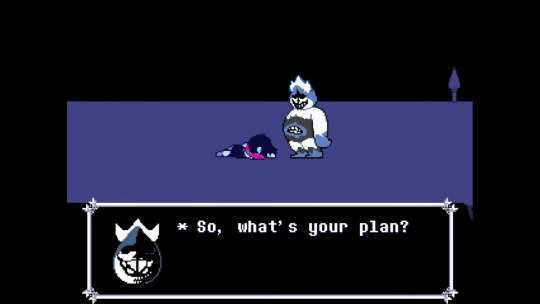
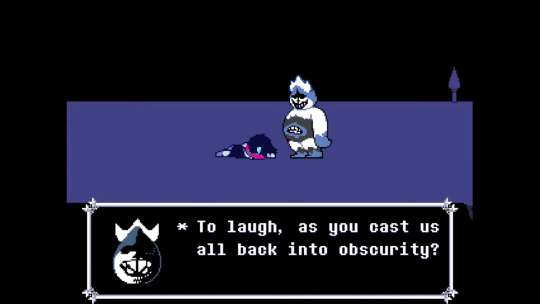
He sees friendship as Lightners just using or tricking his fellow Darkners. In his eyes, Lightners will always see Darkners as objects first and foremost. To Lightners, they will always be Things that will become obsolete and will get thrown away eventually. Their eventual abandonment is inevitable, and if it hasn’t happened yet… it will happen sooner or later. He rationalize his closed-off and cruel heart as just…. The only possible way to respond to the Lightners’ inability to care for them.
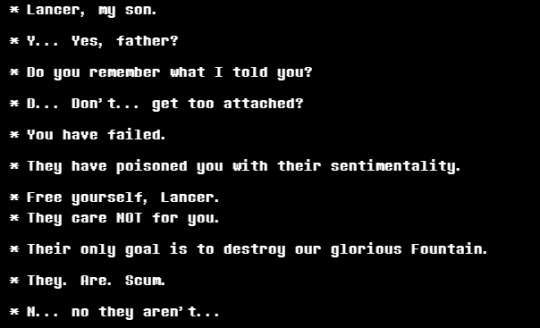
On some level this is meant to be an obvious parallel to Susie and her mindset pre-Character-Development. She has also a hurt person who constantly lashed out at others because experience had convinced her that everyone was gonna abandon her at best, actively hurt her at worst.

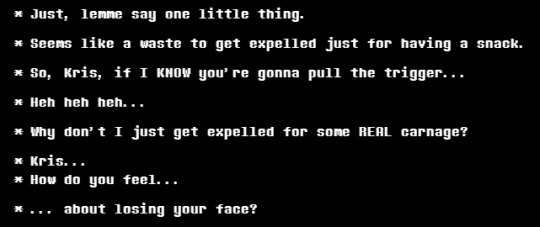
As the lead villain of Chapter 1, King obviously played a huge part in Susie unlearning that toxic coping mechanism. Although... I don't know if she consciously noticed the parallels between them or if it's mostly about how his existence is the impetus for her conflict with Lancer, that taught her about the importance of non-violent conflict resolution and not assuming the worst of people
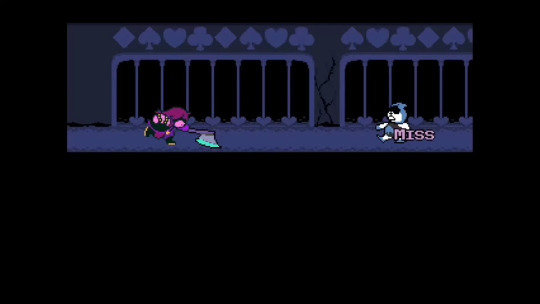
And also the cause of her and Kris becoming Battle Buddies.
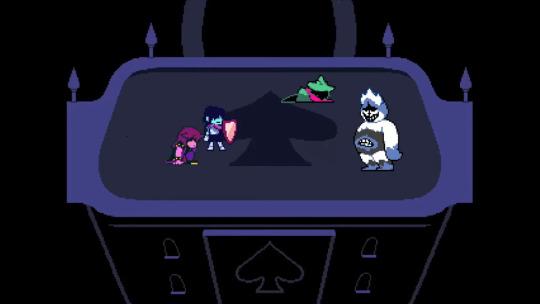
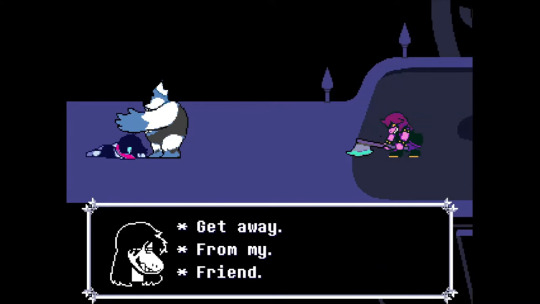
And... also, since Chapter One, Susie has been consistently invalidating King's justification for his cruelty. Even if he refuses to acknowledge it, and Susie herself not really understanding King’s reasoning at the time and probably not really consciously thinking about them since she kicked his ass, she has become the walking, roaring, axe-swinging counterargument to King’s whole deal.
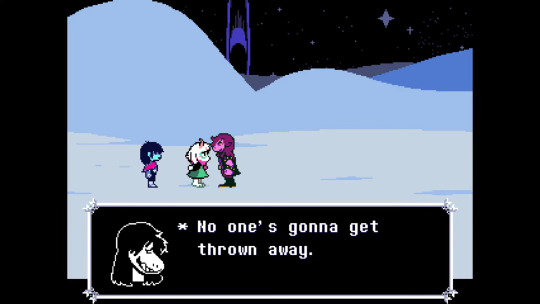
Susie always treats Darkners as people, or, well, at least since she learned to treat people in general as people. At first she didn't even understand the concept that they're 'really' objects, and when she did, she adamantly refused to let this change the way she sees them. And especially refused to ever allow them to be abandoned and cast aside.
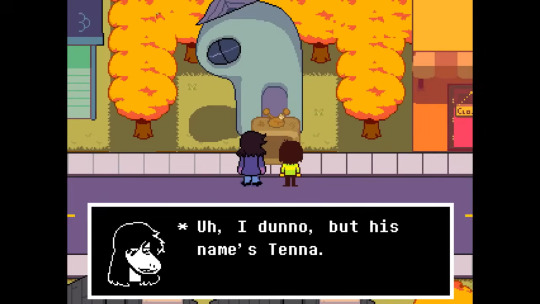
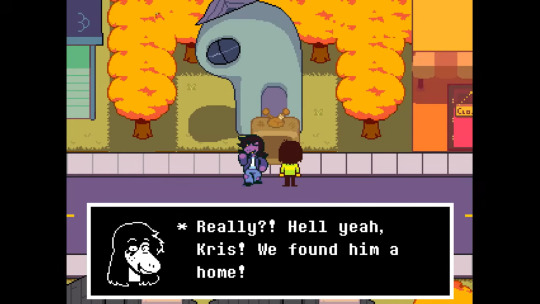
Being Recruited into Castle Town seems like it's basically circumventing the terrible fate King thought the Card Castle Darkners were condemned to when their Fountain was sealed... But he doesn't buy it. He just think about it as the Lightners once again temporarily taking them out to play, and that once Susie and Kris get finish their adventure or just get bored, all the Darkners will be cast out once again - justifying his decision to continue to wallow in misery and resentment in his cell.

And... it's not like he's totally wrong. At the very least, we know that the leader of Castle Town would have rationalized it as a totally understandable and justified move if they all stopped being of use to Kris and Susie.
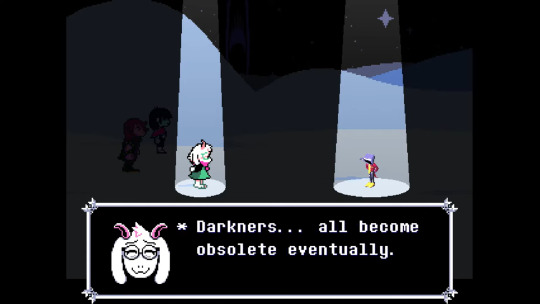
But we know that’s not how Susie sees it, for her the people of the ever-growing Castle Town are just as real as the people of Hometown…. The only difference is that she probably has more friends in Castle Town.
But at this point I think King might be far too emotionally invested in his own pessimistic distrust to see it, to know that Susie totally defy his cynical expectations of the world, that maybe Susie is exactly the Lightner he wished for when he still had hope in his heart… and even if he did… Susie sees him as a person, but in this case she sees him as a total asshole and it’s hard to imagine that impression of him changing anytime soon.
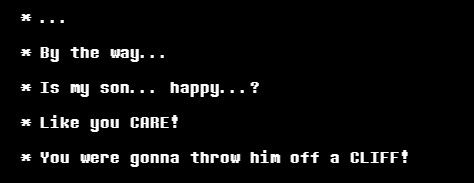
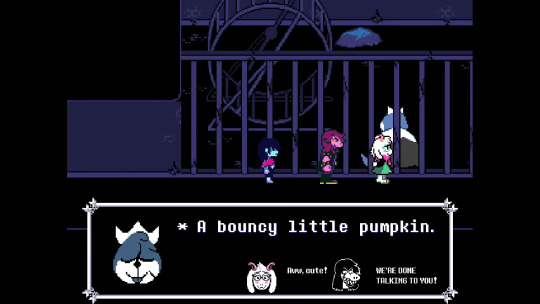
#deltarune#utdr#delatrune#deltarune chapter 3 spoilers#deltarune spoilers#deltarune susie#utdr fandom#utdr spoilers#deltarune chapter 4#susie deltarune#susie dr#king#king deltarune#spade king#king spade#king of spades#chaos king#deltarune king#deltarune chapter 1#deltarune chapter two#deltarune chapter 2 spoilers#deltarune chapter 3#deltarune chapter 4 spoilers#deltarune chapter four#deltarune chapter three#dr susie#deltarune chapter one#deltarune analysis#deltarune meta#deltarune thoughts
118 notes
·
View notes
Note
Evil Shounen protagonist: I love non-violent conflict resolution but I hate my friends and binge eating
Evil Shojo protagonist: I'm early! I'm early! On my Last Day of school! (shoves hot guy out of the way)
Evil Isekai protagonist: I'm so weak, I guess I'll see if any adult men are willing to work for me.
Evil 4koma protagonist: This comic has 5 panels
56 notes
·
View notes
Text
How Armin Represents Peace and Why, Thematically, That Made Him the Right Choice:
I think one thing that gets lost in the constant bickering over whether Armin or Erwin was the right choice during the RtS arc, among other things, is that Armin, from the start of the series, was really the greatest proponent for peace. Out of everyone, he was always trying to find non-violent resolutions to conflict, and I think what people don't understand is how Armin's commitment to peace itself represents the overarching theme of "Attack on Titan" which advocates for peace.
Everyone always gets lost in the weeds of this discussion, arguing with one another over whether Erwin would have been able to avoid the situations as they unfolded after the time skip, speculating over whether he would have been able to stop the Rumbling, whether he would have been able to stop the Yeagerist coup, whether he would have foreseen Eren's betrayal. I've spoken about this innumerable times myself, so I won't get into it here. But I think focusing on this aspect of Levi's choice really misses the point of Levi's choice, which is that, by choosing Armin, Levi essentially chose the narrative representative of peace above conflict.
Think about it. From the start, we see Armin adopt what amounts to a pacifist stance. Well before joining the Survey Corps, we see Armin refusing to fight back against his bullies, and this is contrasted directly with Eren's confused frustration, questioning Armin on why he doesn't fight back. Immediately this sets the tone between Eren's aggressive and hostile nature and Armin's pacifist and peaceful one. We're meant, in the end, to see Armin's stance as the right one, and Eren's as the wrong one. People just don't realize until the end, because Eren is the "protagonist", and so we think for a large chunk of the story that he's meant to be "the hero". Eren as much as lays this out during the argument in RtS, when he talks about how all he's ever known is how to fight, but that Armin was more than that, that he had dreams and hopes beyond the thought of fighting, beyond the idea of destroying his enemies. That he saw beauty in the world and how that made him uniquely equipped to save it.
There's countless examples of Armin's advocacy for peace, from the aforementioned way he deals with his bullies, to his, Eren's and Mikasa's first encounter with the Military Police, after Eren manifest a partial Titan husk to protect his friends, with Armin successfully talking the MP's down from killing Eren on the spot and negotiating to keep him alive. We see Armin attempt to negotiate with Annie in Trost before things go sideways, and we see him attempt the same with Bertolt in Shinganshina. And of course, in the culmination of this consistent trait, we see Armin convince Zeke to help stop the Rumbling and, afterward, talk what remains of the Marleyan forces down from slaughtering the Eldians and later going on to become an ambassador for peace, traveling to Paradis, hoping to lead the way to a lasting cessation of hostilities.
Armin was always an advocate for peace, and that's really the overarching them of "Attack on Titan". The story pushes this idea that, even when there's no chance of it succeeding, we should always strive for peace, regardless, because if we don't even try for it, then there's no hope of it succeeding at all, and we'll only ever be left in a perpetual cycle of violence and cruelty. Similarly, I think, to how the story advocates for compassion, in multiple ways, but no more so than in Levi's choice itself. And so it makes perfect, logical sense to me, how these two themes are really coupled together in Levi's single choice, how he ends up both choosing compassion over cold logic, refusing to sacrifice a single man's humanity for an ideological cause, and how he ends up choosing and believing in the hope for peace, even in the face of history's bleak insistence of the inevitability of war.
It isn't just a question of who was the better choice in terms of strategic value. It's a question of who better represented the overarching themes of "AoT", and I think, unquestionably, that person is Armin. By choosing Armin, Levi was basically saying he believed in the possibility of peace. I think that's why he says, at the end, that he has no regrets about not choosing Erwin, because he believed so much in the power of Armin's hope. He believed Armin's hope could bring about the better world that all of the Scouts had given up their lives to. Because Armin believed in that better world. More than Erwin. More than anyone, really. And I think Levi understood, in the moment he made his decision, that in order for that world to manifest into being, they needed someone who believed wholly in its possibility, the same way, I think, Levi understood that denying a suffering man compassion would only perpetuate the cycle of cruelty that had led them all to such bitter and hopeless circumstances to begin with.
Outside of any questions of pragmatism, Levi's choice was the right one because it was a choice defined by its refusal to give into the ugliness and despair which makes up so much of the human condition.
I think that's also why Armin never cast judgement on Levi the way so many others did, a kind of nonjudgmentalism, rooted in emotional intelligence, that's reflective of Levi's own. It's one of many similarities shared between Levi and Armin, this ability to empathize, and to refrain from passing judgement as a result. A willingness to understand and accept the thoughts and feelings of others. I think Armin always understood what was at the heart of Levi's actions, which was an unwavering belief in the sanctity of life, driven by an exceptional compassion, because Armin holds the same belief. It's why we see Armin be as willing and ready as Levi to dirty his own hands, to not shy away from acts of violence simply to preserve some claim of moral purity, so long as it means protecting others from having to do the same, so long as it means saving lives. Armin always understood Levi, because I think both of them have always understood that life had value without needing some great purpose to justify its existence. Subsequently, as I talk about endlessly, that's why Levi has always worked so hard to prove the deaths of his comrades had meaning, because he couldn't accept that the inherent value he saw in their lives could be snuffed out without purpose. That's a product of Levi's great belief in life's innate worth. To him, it was never acceptable or right, that something so precious could be wiped out for nothing.
That's why I find both Levi's and Armin's endings, with the both of them carrying on in their own ways, working toward that better future, still believing in life's worth and expressing that belief by continuing to live themselves, despite all the great suffering they've seen and all the great loss they've endured, to be so moving. I think, in many ways, both Levi and Armin each understand, better than anyone, the value in simply being alive. They, each of them, always fought for life fiercely, in their own, unique ways.
74 notes
·
View notes
Text
rant. this was a vent in response to the final chapter, but the anime reaching the heteromorph riot arc got me all whiny again. embarrassingly personal.

On "Peaceful Resolutions" + general heteromorph riot arc stuff
When I was in elementary school - I forget what age - there was a snow day. Children love snow days. Me, my younger sibling, and my grandmother went outside to play. We wanted to use the neighborhood hill to sled. Unfortunately, it was already being used by some older kids. Middle schoolers only a few years older than me?
They didn't want to share the hill. So they pushed and shoved us. They threw snowballs at us. When I cried for them to stop, they laughed. When my grandmother, who didn't know English, who spoke only Chinese, yelled at them to stop, they laughed, and mocked her. "Ching chong ching chong." After that, no matter what me or my sibling said in English, they pretended not to understand and just kept chanting slurs. There is nothing more frustrating than screaming out your pain that you know people can hear and understand, and having it fall on deaf ears; more than that, your pain is enjoyment for them.
Was this discriminatory incident resolved peacefully? Well, me, my sibling, and my grandmother cut our snow day short and went home. Our retreat was 'peaceful', but I guess the incident wasn't exactly resolved.
Would attacking them back helped? No, of course not. (And not that we could. We were two elementary kids and an elderly woman. Understand that bullies nearly always purposefully target those weaker than them, ones who can't fight back without negative consequences.) Indeed, things would've just escalated. But we didn't want to retaliate. We didn't want revenge. We just wanted them to stop.
Did we do anything about it? No, it was just some kids being mean. A very minor thing (even as the incident, only one among others, continues to destroy our perception that this neighborhood was ever safe for us, truly our home. But my town had an active neo-nazi gang that liked to vandalize houses and slip posters into newspapers, so it was never going to be safe.) We didn't know our neighbors well because of language barriers, because we stood out as a Chinese family in a largely white neighborhood and people didn't talk to us much either. We wouldn't know how to alert the parents of these kids. And we thought, even if we did complain - a non-violent method of action - they might just find us annoying. They might hate us more. What if the language barrier leads to more confusion and conflict? We didn't want to risk it. We kept our heads down and let the incident go. My family became more reluctant to go out, to let me and my sibling outside to play. We maintained the peace.
Understand that it doesn't really matter what an discriminated minority does to resist discrimination - the perpetrator can find any act of resistance inappropriate. That is their prerogative by being in the position of power.
Shoji saved a girl, gave the community peace by preventing them from having to grieve her death. His village then bashed his face with a hoe for daring to resist and break the norms of the village, for daring to touch the girl to save her life.
A third party, of course, can come and resolve the incident by de-escalating everything. But for my incident, it was not me that this third party needed to stop. We did not engage in violence. It was the older kids. And had I retaliated - idk how, as a child; tackle them? - to protect my grandmother, my younger sibling - that would be self defense, likely because I wanted the bullying to stop and had to resort to violence when nothing else worked; because I feared the violence they were about to do to us more than my fear and reluctance to engage in violence in the first place. Maybe self-defense is too strong a word here for schoolyard bullying, but the principle is the same.
(It wasn't just schoolyard bullying, obviously. There were other incidents, from when I was younger, when I'm much older. This incident is one that I feel is less revealing/personal/vulnerable to tell.)
There was no peace in that incident that wasn't broken by the perpetrator to begin with. Not that the peace was peaceful for us in the first place. Bringing about true peace is solely on stopping the perpetrator, and ultimately on dealing with the root cause.
“Discriminatory incident” is so vague. An incident can be anything. “Peaceful Resolution” implies responsibility on all parties. What we're told isn't 'Shoji stops the bigots nonviolently'. (Also: The bigots are afforded this. Villains must be put down with violence, but not the people throwing rocks and spraying pesticides on children. I'm of course of the opinion that violence shouldn't be used to stop bigots or Villains except as a last resort, but the manga has demonstrated that no Hero ever stopped a bigot using the same methods they use on Villains. Why is that?) It isn't 'Shoji saves victims of hate crimes'. Judging by Shoji's own statements and how the heteromorph arc plays out, a peaceful resolution is stopping both the heteromorph victim (who may or may not be lashing out - in response to the hate crime) and perpetrator - If anything, more stopping the heteromorphs.
I’m going to suggest that rarely, heteromorphs ever actually retaliate with violence. True, the heteromorphs we see (Shoji, ordinary lady, Koda's mom) aren't part of the rioters but are we to believe all these rioters are people who react with violence every time, and it's their first solution? When they stopped the damn riot themselves because they didn't want to hurt the healthcare workers? (and even the riot wasn’t purposeless, indiscriminate violence - they were solely there to retrieve Kurogiri). Pig Nose guy says he's been beaten up for no reason, so he's already at the receiving end of violence that justifies self-defense, but we can assume he didn't actually lash out any of those times because he's the one who stops everyone, feeling so bad about just the idea of hurting someone.
I can’t say that’s 100% canon that none of the heteromorphs ever lashed out (and of course ‘statistically’ some of them must have), but overall, for most of them, it’s a legitimate assumption to be made. The heteromorphs from the Jeda or 6/6 incidents were fully massacred. Shoji and Spinner were children - Shoji was on the ground, getting bashed in the face with a farming hoe wielded by an adult. Spinner got sprayed with pesticides for walking outside and became a hikikomori, saying that he accepted being a ‘lizard freak’, he was ready to give up. (And he only took action when the extraordinary moment of Stain getting on TV made him realized he hated this suffocating world where Heroes failed him, never protected him.) Ordinary Lady never lashed back out at her attackers. Koda’s mom had to be protected by Koda’s dad.
Even the PLF agitator - his wound is a long deep scar on his head - a head injury that would’ve thoroughly incapacitated him, if not kill him. It is likely not the wound of someone hitting back with self-defense as if the PLF agitator was the one attacking someone and they were fighting back for their life.
These are the ‘Discriminatory Incidents’. What does a peaceful resolution look like, here?
The heteromorphs at the hospital aren’t there to get revenge. They’re there because they’ve been pushed into a corner and probably have become afraid for their lives, their future. During a national crisis where Heroes order civilians to go into hero-guarded shelters, these shelters had the audacity to refuse heteromorphs, leaving them out on the streets, vulnerable to the dangers of jailbreakers and lack of resources.
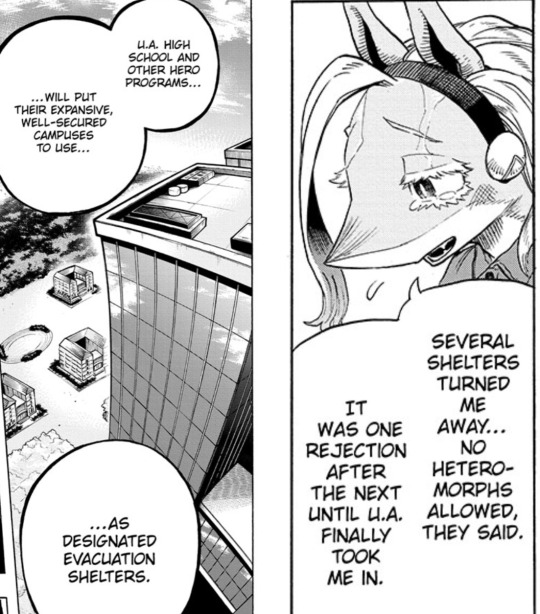
The peace was broken first by discrimination. The heteromorphs probably took Spinner’s call to action as a life preserver. Heroes had refused to protect them during the collapse of the state; and so they likely found truth in Spinner’s word that if Heroes win the day, nothing will change. They weren’t there to hurt anyone at the hospital - they were there to take back Kurogiri.
But Shoji framed the whole thing as revenge, as being avengers. He accused the heteromorphs of being violent and non-peaceful, without ever naming the first act of violence on the part of the non-heteromorphs. He didn’t want to risk the heteromorphs’ hard-won reputation and status (“You’ll set us back 30 years.* They’ll target your children.”) He wanted the heteromorphs to do what my family did - kept our heads down and let the incident go. Maintained the peace.
Shoji said that those who hurt the heteromorphs weren’t justified, but he then says “there has to be a better way”. We never find out what this was, beyond the vague ‘Shine bright’.
(I shined bright, too. I was a straight-A student. I did extracurriculars - piano, viola, art, softball. As did my sibling. My family were hard-working citizens. My mom worked two jobs. I hate telling these details, because they don't matter. My worth as someone who doesn’t deserve to face discrimination does not and should not depend on my grades or trained skills, how pleasant or cool I seem to someone. None of that matters to the people who wanted to hurt us because they simply saw being visibly Asian American as the offense.)
We don’t find out how Shoji’s better way works in the final chapter either. Just that he resolved the incidents ‘peacefully’. Because he wanted to solve discrimination peacefully. As do everyone, oppressors and the oppressed. But ‘peace’ often means something different to oppressors, and something different to the oppressed.
(Did Shoji resolve the heteromorph riot peacefully? Not really. He shouted a lot to the crowd, but he also fought Spinner (ah, you might say - well, Spinner was using violence! Shoji has to react to that with punching as well! Yeah. That's what I mean.) Koda had birds shoved someone off a building.)
Shoji’s better ways - I will assume it’s stopping the blood cleansings. That is a noble goal. It is a necessary and vital goal. And so, how? How does he cover the large areas of rural land, so that he’s there to stop these hate crimes? How does he know when something will happen? Is it a campaign and community-level action? Uraraka’s tackling of Quirk Counseling is a ‘project’, widespread and implemented on a macro level. Shoji’s efforts are on what’s implied to be individual incidents. But putting that aside for now, I will assume “resolving” is talking down the perpetrator. I will assume it’s protecting the victim while negotiating with the person holding the weapon.
Peaceful implies that he does so without violence (as he should! As a Hero Law Enforcement of the State!); but a blanket label of ‘peaceful’ also implies stopping the other party (the victim) asking them to stand down as well.
I just think - during my Discriminatory Incidents, how can anyone have me stand down, have stopped me, when I haven't done anything in the first place? And if I did have to be stopped from engaging in self-defense, that's not a resolution. That's a save. That's someone saving me from the violence, saving me from having to resort to violence.
Heroes save people. There's no question of 'peacefully' when they fight villains to save people. There’s no framing of ‘peacefully’ when they do so. But it seems heteromorphs are not allowed the same language of ‘peacefully’ and 'save'.
-
tl;dr. idk. the heteromorph mini-arc’s writing and message is awful.
-
*re: “set us back 30 years.” I know we don’t know exactly what happened 30 years ago, but we can guess - and so I don’t think guessing one of the named massacres is too wild. From my own experiences, the murder of Vincent Chin was about 40 years ago. I grew up with Vincent Chin as a horror story.
Being told that, due to whatever actions I was doing, would set back all that progress Asian Americans made since then is just cruel and wrong and illogical in all ways. Vincent Chin didn’t deserve to be murdered whatever he did 40 years ago, and he deserved to have his murderers be brought to real justice. The sheer injustice of that case is objective. There is no way someone can tell me that I’m setting time back to when the murder of Vincent Chin happened, that I would be causing injustice like that again, I’m responsible for any more murders that happen, and have that be in any way true.
Related— On Bnha's apparent ideal of "a hero is someone who is willing to suffer in silence" and "we'll get it right next generation!"
From Asian American Dreams, by Helen Zia:
The reaction within the Detroit area’s small, scattered Asian American population was immediate and visceral. Suddenly people who had endured a lifetime of degrading treatment were wondering if their capacity to suffer in silence might no longer be a virtue, when even in death, after such a brutal, uncontested killing, they could be so disrespected.
[...]
Vincent was part of an entire generation for whom the immigrant parents had suffered and sacrificed. Other Asian Americans also found a strong connection to the lives of Vincent, Lily, and David Chin. Theirs was the classic immigrant story of survival: work hard and sacrifice for the family, keep a low profile, don’t complain, and, perhaps in the next generation, attain the American dream. For Asian Americans, along with the dream came the hope of one day gaining acceptance in America. The injustice surrounding Vincent’s slaying shattered the dream.

#nalslastworkingbraincell#i hate using personal anecdotes to argue a point#but can't help it this time
150 notes
·
View notes
Note
That katara take is not only incredibly silly, it misses the point of her relationship with aang by a mile. People really wanna see 'problematic' where there isn't any - god forbid some people date young and actually stay together, lmao
I want to start this off by saying that this isn't about bashing Kataang, or Aang for the matter.It's about acknowledging how Katara as a character gets sidelined the moment she and Aang become canon.
For context, I reblogged this post from @southslates
" I always feel bad for katara in the context of her life after atla because like, she's fourteen when this twelve year old avatar decides that she's his forever girl. and the whole world knows it and even if she'd eventually left aang, she would always have somewhat been the avatar's girl. maybe it looked like she had a choice but she didn't, not really. even if she eventually would have chosen aang that choice was taken away from her. that stings. "
That moment in the finale where Aang kisses her isn't just a romantic resolution—it’s a narrative full-stop on Katara's autonomy. From that point on, her development is flattened.Lets start with the comics, the direct sequel to the series.In the spirit of keeping things brief, I will not unpack every single interaction between her and Aang in all the comics but ill highlight the ones that stuck out to me the most, but if youre interested in a more throuought unpacking ill link @araeph's series, Katara : Consumed by destiny.I highly recommend checking it out, its a really interesting read.At this point in the timeline, Katara and Aang are officially together, and as such the nature of their relationship has changed..but to the detriment of her charather.
In the promise, Katara's role is diminished primarily to that of Aang’s emotional support. Her feelings and actions revolve entirely around him, and she never voices independent opinions or challenges him, even when she arguably should—such as when Aang is debating over killing Zuko.In s3, we see Aang's internal conflict about having to kill ozai and how he overcame it.Here we are a year later with a rehash of this problem--Aang, a 13 year old non-violent, peaceful monk anguishing whether or not to kill a tyrannical firelord. Not only does Katara offer no real emotional insight on this, but actively encourages him to not only go against his values but dosen't reflect how that might affect him, her and the rest of the gaang on an emotional level.Isn't Zuko supposed to be her friend ? Broski took a literal lightning bolt to the chest for her.
This pattern continues throuought the rest of the comics--In The Search, she essentially acts as Aang's body guard and she and Sokka are Zuko's role model for the Ideal sibling dynamic.We don't see her motivation for going on this trip at all--Its almost like the only reason she's there is because Aang is, or because she's a member of the gaang--so she needs to be there.If so, where are Toph and Suki ? Hell, It makes more sense for Suki to be there instead of her, since her job is centered around protecting the Firelord ! We also never get to see her feelings on the situation, or especially Azula ---Katara literally witnessed the Fire Princess try to kill two of her loved ones TWICE.You would think that the authors would delve into Katara's feelings on the matter.The last time Katara saw Azula was during the last agni kai and Azula was chained to a metal gurder and crying hysterically.You would think that Katara would have some strong emotions about the Fire princess.Anger at her for all the times that she tried to kill her loved ones ? Guilt for being partially the reason that she got sent to the asylumn,Pity because her current condition ?
On a similar note, why hasn't Katara helped her ?Since Katara's has been established as the emotional support member of the friend group, you would think that because of her caring nature, she would at least attempt to help Azula with her mental troubles, despite her complicated feelings towards the princess.This is the same girl who tried to help a starving village from a nation that she hated, the same girl who tried to heal Zuko's scar when they were technically still enemies, the same girl who was the first to reach out to Zuko and catch him from falling to a painful death despite actively hating him.
I don't have much to say about smoke and shadow except for the fact that there was no reason for Katara and her brother to not be there for the majority of the comic---The Gaang knows that the Fire Nation isn't a big fan of Zuko at the moment and I don't understand why she and Sokka couldn't have been there to help defend Ursa and Co as a show of support for their friend.And their help would have been invaluable during the Kemurikage crisis--showcasing Sokka's skills as a strategist and engineer and Katara's leadership skills during a search and rescue of the kidnapped kids as well as her waterbending .Show!Katara, defendor of the defenseless would NOT have left the fire nation if she knew kids were involved imo.The Rift tries to set up an arc for her to go down, but just as quickly she is pushed aside in favor of Toph and Aang's respective plotlines.
The comics do not provide Katara with opportunities to showcase her strengths, wisdom, or leadership qualities.By relegating her to the background and not making her an active participant in the plot, she becomes little more than Aang's arm candy.
This becomes more apparent in LOK.There are no statues of her while everyone else in the gaang ( except for Suki, because the writers completely forgot of her existence post comics-) gets at least one.We know nothing of what she did during her time in republic city.We know that she moved to the United Republic to start a life with Aang, but what did she do during that time period ? We know that she ( allegedly, since it isn't acknowleged in the court scene ) led the efforts to outlaw blood-bending, which is in charather for her to do and the most logical since out of everyone in her friend group, she was the most affected by the effects of blood-bending because of what happened with Hama in The Puppeteer. Yakone abused his powers to terrorize Republic City for years. Katara, famously known for her activism in the face of injustice should naturally have been front and center on that trial, as a founding member of republic city and representative of the SWT. But no.Sokka lead Yakone's trial and delivered the crime lord's sentence.Sokka, who although was also affected by bloodbending, should have been in the SWT, leading or at least preparing to take over as Chieftain of the tribe.
So what did she do during her time in republic city ? Become a stay at home and raise the kids on Air Temple island while Aang flew all over the world, settling disputes and building bonds ? While Republic City ran rampant with crime and discrimination ? Becoming a stay at home mother is completely fine, but it clashes who we know Katara is as a person.We know that she would not sit idly by and do nothing as injustice was happening right in front of her.As we speak of injustice...
Katara sat idly by as Aang blatantly neglected his two eldest in favor for their youngest, Tenzin.
Im not expecting Kataang to be the perfect parents.Katara lost her mom early on in her life and her father was absent when she and sokka needed him the most and Aang is also the Avatar but is also the last person of his kind--a group of people who had a different take on raising children then the other three nations.The very notion of a " Nuclear Family ", hell even marriage is one he didn't grow up with.However, Katara values family deeply, and as a mature emotionally in-tune woman would have seen the effects of Aangs ( unintentional ?) neglect on his other children.She would have known how they and been able to empatize with them, especially since she experienced the same neglect due to Hakoda anbandoning her and Sokka when they were younger.The Katara we know would have not idly stood by and let her children suffer--she would have talked to aang and ensured that all their kids got the love that they deserved. But she didn't.And Bumi,Kya and Tenzin suffered for it.In Korra's time, Katara's relationship with her family is superficial.Her grandchildren don't see her often, to the point that her youngest grand-child dosen't even recognize her.She sits idly by as her family and friends are targeted and attacked by their enemies ( Amon, the red lotus, Kuvira) while Zuko and Toph--charathers are moving earth and sky to protect their respective families.
Katara isn't even present at their successes--not joining them when they were in the SWT, not joining them family trips, and she certainly wasn't there for her Jinora's air mastery ceremony, even though what was left of the Gaang and Korra who was wheelchair bound at the time, attended.
Furthermore, Katara is the last member of the gaang who is narratively the closest to Korra.Despite possesing the spirit of her ex-husband, Korra is a fellow member of the SWT and her student.Katara personally helped oversee the young avatar's training--by that logic they should have been very close.Yet Korra rarely, if ever seeks her council, and when she does need her assistance, Katara is always unable to help her.Katara, who we are constantly told is the worlds best healer.
Katara, who post show was made to only focus on her children and her healing abilities, failed at even just that.
Katara always stood for agency, for compassion with conviction. But the franchise reduced her to caretaker and emotional backbone for the Gaang—noble, sure, but not a full reflection of who she is.
Katara never got the space to evolve as an individual after the war, and this lack of narrative focus reinforces the idea that once she became "Aang’s girl," her story was finished. A core part of Katara's character arc was her refusal to be defined by anyone—especially a man—but in the end, she was overshadowed by one. What’s truly painful is that it never felt like Katara had the freedom to make that choice for herself. That’s what truly stings.
In the end, this isn’t just about romance or ships—it’s about the integrity of a character who meant so much to so many. Katara deserved a future shaped by her own choices, filled with growth, struggle, triumph, and identity beyond just being someone’s partner or mother. The narrative didn’t give her that. It reduced a vibrant, driven, compassionate, and complex girl into a symbol of domesticity and emotional support, without ever exploring the cost of that transition. Katara was never just “the girl.” She was the heart of the Gaang, a master waterbender, a revolutionary, a sister, a friend, and a fighter. And it's heartbreaking that the legacy of such a dynamic character was ultimately treated as an afterthought. She deserved more—and so did we.
#atla#katara#atla gaang#anti atla comics#kataang#atla aang#avatar the last airbender#this is not anti aang#i love my boy but#atla sokka#atla zuko#atla toph#atla azula#pro katara#I love you pookie
46 notes
·
View notes
Text
The popularity of drugs and the eagerness of conservative politicians to cut state hospital budgets explains the quick pace of deinstitutionalization in California.86 From 1970 to 1974, California reduced the number of state hospitals within its system from ten to seven and converted or limited services in the remaining hospitals to specialized types of care. This physical shrinkage translated into an eighty-three percent reduction in the state hospital population, from 36,000 patients in 1955 to less than 6,000 patients in 1977.87 When taking into account the number of patients who passed either through the doors of a state hospital or county ward for treatment, California also reduced the number of patients it institutionalized for any given amount of time by fifty-three percent (558,922 to 193,436) from 1957-1977.88 Under the LPS law, this new system reflected the belief that mental illness existed on a continuum between “normal” and “violent” states by only temporally holding the mentally ill when they were considered dangerous and releasing them into society when their florid states subsided.
West sought to advance racially liberal psychiatry by conjoining psychotherapeutic concerns around child development with the fields of biological psychiatry and psychopharmacology. In an era of growing alarm about the availability of public funds, he believed the future of community mental health required money be diverted away from “non-medical” anti-poverty programs and towards resource- and capital- intensive lab-based psychiatric research and medical education. Although he began the mid-1960s using interpretive frames of culture, race, and class to explain violence, he increasingly became interested in unlocking an underlying biologic basis for violence that rendered such frames less meaningful. His attempts to find a universal color- and class- blind basis for violence, however, ended up strengthening policing of poor people of color by reinforcing their spatial segregation from society in prisons, state hospitals, and segregated neighborhoods with new ideas about the social transmission of violence.
Comments West made after the 1965 riots/uprisings demonstrate he initially agreed with most race-based community mental health proponents that normal black personalities existed among black populations where strict cultural adherence to normative ideas about gender and sexuality was exhibited. On a panel titled “Prevention of Racial Violence in the Urban Ghetto,” for example, West suggested psychiatrists study the Nation of Islam’s program of black nationalism and its strict moral codes for working class black communities because, unlike the psychiatric community and the black middle class, they seemed to be the “only ones who have made significant progress with the prostitutes, alcoholics, addicts and recidivistic criminals who prey on their fellows in the ghettos.”89 His comments suggest he sympathized with Cannon’s belief that separate black cultural spheres had therapeutic effects.
By 1969, however, West was convinced violent behavior had nothing to do with race and/or class, but had everything to do with childhood development. He crafted new arguments about the etiology of violence after closely observing the social relationships of the Tarahumara Indians of Northern Mexico.90 Despite contact with dominant Mexican society, West believed the Tarahumara’s reverence for children and their collective protection of childhood accounted for the perceived absence of violence and its strong commitment to peaceful conflict resolution. In spite of their minority and impoverished status in dominant Mexican culture, he hypothesized the Tarahumara’s limited exposure to violence and dysfunction during childhood created biologic benefits that prevented violent behavior in them as adults.
His hypothesis captured the imagination of UCLA’s search committee and was prioritized as a guiding research agenda for UCLA after he was appointed as Chair of Psychiatry and Director of the NPI in 1969. In a series of joint psychiatric studies conducted by the University of Southern California and UCLA, West and his research team analyzed the case histories of violent offenders “from all walks of life” who, as a group, could not be “distinguished by belonging to any particular groups.”91 His findings suggested that a significant percentage of the study’s violent offender subjects tended to share the same history of being “victims of violence in childhood themselves.”92 His observations produced a new color- and class-blind psychiatric theory he eventually termed epidemiology of violence theory, a concept which proposed dysfunction witnessed as a child created a psychobiologic basis for violent behavior as an adult. In other words, he argued that childhood trauma altered brain functioning enough to make violent behavior a predisposed inevitability in adulthood.
West was convinced his theory had enormous potential for renewing community mental health’s moral discourses of prevention and hygiene and for generating a whole host of research investigations for psychopharmacological-based rehabilitation programs for a group he termed “violent people,” individuals biologically disposed to violence because of childhood exposure to dysfunction. For race-based mental health professionals, his research sustained focus on the importance of childhood development and the place of positive role models in producing well-adjusted personalities. For mental health researchers accustomed to research in biologic psychiatry, particularly in the fields of electroshock therapy, electroencephalography, psychosurgery, neuroscience, and psychopharmacology, West’s hypothesis offered a useful bridge to the popularity of social science and psychotherapeutic study that defined psychiatry since the 1920s.
Nic John Ramos, Pathologizing the Crisis: Psychiatry, Policing, and Racial Liberalism in the Long Community Mental Health Movement. Journal of the History of Medicine and Allied Sciences, Volume 74, Issue 1, January 2019, 57–84
50 notes
·
View notes
Text
Tips for “Good-Aligned” Astarion Romance/Approval
I see a lot of people saying they find it difficult to romance Astarion on more good-aligned play throughs (though bg3 doesn’t have an alignment system but you all get my drift).
I was able to do so fairly easily, on my first play through as a goody two shoes (or as much so as a Dark Urge can get) and I noticed some things that may have made it easier to do without sacrificing any in character goody-two-shoes decisions.
And this is the biggest one. Be nice to him, and be incredibly patient with him. Even though he occasionally expresses disgust with you acting “sweet”, overall being a saccharine ball of love to him wins you way more points than you’ll lose by being kind. He values positive personal interaction way more than he values agreeing with your decisions,
He does actually approve of some good decisions: petting owl bears and feeding an urchin in Baldur’s Gate being some examples. And more than that, he REALLY approves of tricking your way into peaceful resolutions, to the point where I have gotten many inspiration dice from him simply for avoiding conflicts. Also, any time you have a chance to support someone’s free will, do it. He varies from not having an opinion to approving in most of these cases. So really lean into those good actions he tends to approve of, though I admit they usually are later in the game.
Sometimes he’ll disapprove of the steps you take to make it to a good choice, but approve of the outcome. This applies to things like the hag quest, where you can lose approval but win it back at the conclusion, or through the non-violent path with the Orthon where he disapproves if the peaceful conversation but approves way more of the outcome than he ever disapproved of the conversation.
Be willing to disagree with him, and challenge him, even when it does get you disapproval, because, frankly, the push and very interesting unique dialogue he has with goody-two-shoes PC’s he’s in love with can be fascinating and informative, even if it means running into some bumps here and there.
Remember that this is just some tips for people who find the prospect of keeping Astarion approval high on a good play through daunting or challenging. I know I see a lot of memes and such that make it appear that only evil and/or grey characters can really get into this romance when I’ve seen firsthand that it is just as cool and possible with even the goodest of beans, so I wanted to share. But it is not, IN ANY WAY, meant to be a guide on how one should romance him. There are multiple paths to romance that can be played differently to create very custom PC/Companion ship dynamics in this game, and I encourage you to explore whichever narratives will be the most fun or fulfilling to you personally.
#bg3#astarion romance#astarion ancunin#astarion#bg3 astarion#bg3 spoilers#baldur’s gate 3#baldur’s gate iii
1K notes
·
View notes
Text
Veryl Ingellvar Writing Characterization Cheat Sheet | Ver. 1.0

(May 17, 2025) I tried to put this into easy terms, things that I would want to know if I was trying to write her for the first time. I Frankensteined together a bunch of different cheat sheets and made my own changes, but was ultimately inspired by the folks over in the Rooks Roost
There is room for interpretations within this, of course. But it is SUPER in depth (but there are still things that need expanding) I reserve the right to edit this with changes (I’ll date them) At some point this will absolutely lead to writing her as a companion. Fanart and Fanfic permissions: Absolutely! Throw her into a Volcano! Make her babysit a child! Have her make people coffee! Make her eat cheese! Make her kiss somebody's dad!
General:
Full name: Veryl Ingellvar (Abelshauser if your character is Ingellvar) The Spectre/Spectre (if referring to her work at the Grand Necropolis before the War of Banners)
Gender: Female
Pronouns: she/her
Race: Human
Age: 27 (by closest estimation, accurate records were lost)
Sexuality: Pan
Class: Rogue - various cross training; whatever the situation requires
Nationality: Nevarran
Faction: Mourn Watch (contentious) ──────────────────────── Looks: Height: Somewhere between 5'10-5'11 (177cm-180cm), Hair: an Ash blonde that shifts with the light, (white in the dark, dark in the light) | long with a right side part. | Much longer in her Necropolis days, she cut it after being excommunicated. Eyes: Heterochromatic- right eye lavender, left eye flat black (a fade touched complication) | Uses side part to distract from the lighter color eye Face: Prone to blushing but other wise no interesting hallmarks
Body: Boney but gaining weight after leaving the Necropolis. | Lean and muscular. | Long Limbs |
- Not picky about the clothes she wears but generally leans towards simple and non-fussy. Prefers leathers when fighting, anything that easy to move freely in. Isn't necessarily keen to be associated with the Mourn Watch and prefers to wear nondescript things that let her sink into a background unnoticed. - No tattoos or piercings. - Has scars along her lower back and hands and between her fingers.
General Likes: Physical touch | sunlight | snow | dumb jokes\bad jokes | smiling | reading, studying, research) | new foods | discussions and debates | sparring | dancing | cats | flowers | reading headstones | black tea with honey and lemon | Chamomile with a little salt. General Dislikes: writing letters | cheese | grave mist | bullies | heat and hot weather
──────────────────────── Skills:
Combat Skills: short sword and rapier | throwing knives | short bow | explosives and electrical | acrobatics | close-quarters offense/defense | excellent with distraction tactics | evasion and stealth |
Other Skills: Improvisation | quick learning | conflict resolution | spirit negotiations | piano | efficient decision making | emotional deflection | psychological manipulation | Fade/Veil sensitive
Languages: Nevarran | Common | able to read most other languages (enough to figure out context)| can easily read tomb script
──────────────────────── Physicality/Psychology
General Behavior: Despite a general tendency towards violent first reactions (of which she tries to curb since leaving Nevarra) tends to be a very gentle person. | Her footsteps are always light and quiet. | Always ready to smile and provide conversation. | Laughter is not easy, but it is welcome. | Reaffirming physical touches. | Closed Posture; crossed arms, resting bored face| Personality: Tends to be blunt and awkward, one step from saying something wrong at all times. | Emotionally stunted. | Hesitates in a spotlight. | Friendly and extroverted. | Avoidant attachment style. | Hides negative emotions, but anger is a driving force (Something she's trying to unlearn after years of rebelling to survive.) | Prone to bouts of deep self-reflection| Extremely courageous, consequently reckless. | Willing to try anything once, food or activity. | Secretive. | Likely to over-intellectualize. | Generally open and informal unless the situation calls for formality. | Takes care of others | Does not take care of herself well |
Flirting: An open flirt with everyone, but it's vapid. | Lots of little physical touches and coy verbal sparring. | Soft smiles and intentional bedroom eyes.
With Established Romantic Partner: Serious romance means open intentions. |She struggles with honesty about her past and about how she feels, but will share as much as she can with her partner. | Values their well-being over her own. | Lots of stolen moments/kisses. | Constant Verbal reaffirmation for both her sake and theirs. | Lots of talking, lots of questions, lots of of laughing, lots of learning.|
With Friends: expressive physical touch | importance of basic trust and mutual understanding | no expectations of return favors |
In Combat: Trying to be the biggest and loudest moving target | Heavy on collaboration and delegation| Quick movements and Quick decisions | whatever it takes to reach the end goal | reluctant leader, but a leader all the same |
──────────────────────── Dialogue/ Communication
Voice: Bright and jovial if not a little deadpan
Humor: Laughs with other people easily | inclined toward bad jokes, bad puns, bad wordplay | occasionally genuinely funny, but usually without intention
With Friends: Putting them first in conversation | Open interest | Hesitant to talk about herself | Playful jesting and name calling |
With Romantic Interests: Anxious honesty | talks about herself | more open with her own feelings and emotions |
Anger: Deathly silent and even toned | No mincing words or miscommunication
Cursing: Yes but it's not constant, and usually for emphasis or to make a point.
Combat: Yelling and attention grabbing | minimal communication in action, heavy discussion before and after the fact ──────────────────────── History: - Found in Necropolis but given to an over-run orphanage in Nevarra City - Had to scrape and scrounge to survive with the other children - Adopted at eleven by noble family who developed her skills, treated like an attack dog, family pet, it was a very abusive situation - Taught piano and rogue training before eventually joining the Mortalitasi and then recruited to Mourn Watch training, passing the tests, taking her oaths. - Wasn't allowed to have friends - Lived at the library, became a speed reader - Served on a special team in the necropolis as a Mourn Watch Rogue that was more or less unrecognized by the Mourn Watch Council - Organized/ Participated in underground street fights - Killed more than her fair share of targets on command - Burned down an orphanage - Sexual rebellion in her younger years led to a loss of fertility and a sexual reservation in her current years - The War of Banners disbanded her team and led to a betrayal that would have her removed from the Necropolis but protected from the Undead Nobles that would have seen her killed for her brash actions.


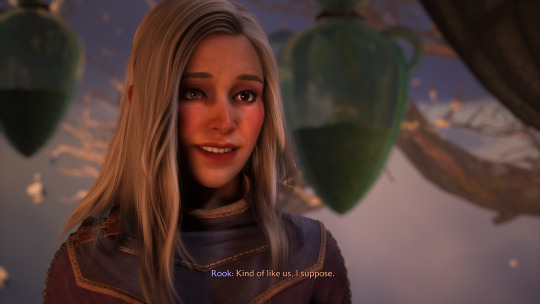
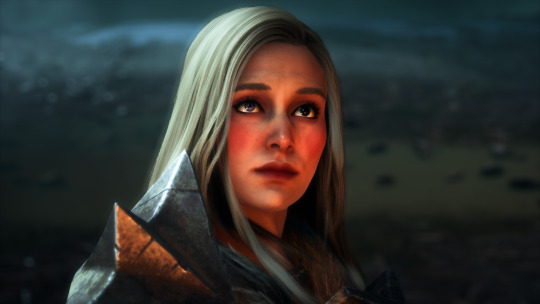
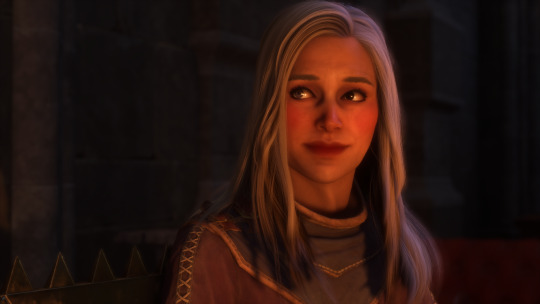

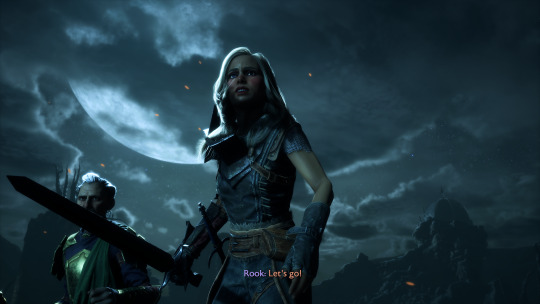

#I made this for you AND me#character cheat sheet#catch me using the same ten screen shots I always use lol#veryl ingellvar#dragon age#dragon age the veilguard#dragon age veilguard#datv#da:tv#dragon age: the veilguard#da: the veilguard#datv rook#mourn watch rook#veilguard rook#my rook#rook dragon age#dragon age rook#da rook
23 notes
·
View notes
Text
Marv.... what the hell
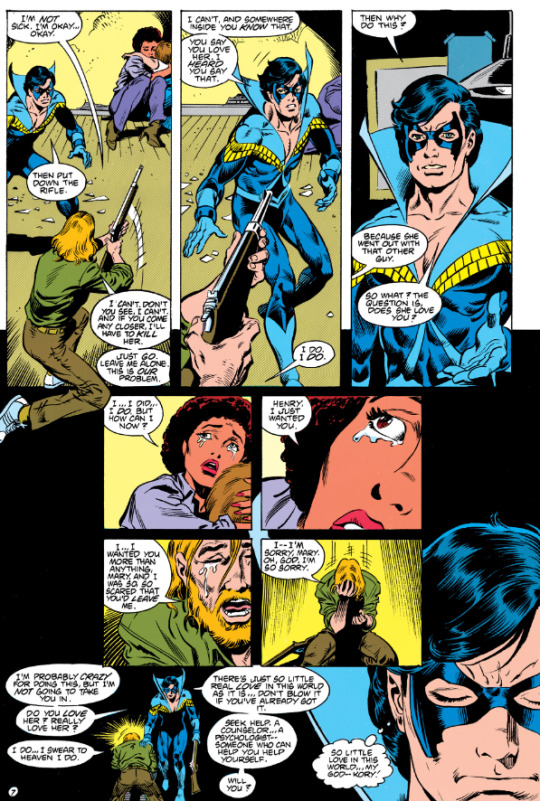
I am all for non-violent resolution, especially for the more street level conflicts, what I AM NOT for is leaving this poor woman and her baby with their abuser! How do you write this and think its a satisfactory conclusion??
#“im probably crazy” <- You are crazy#he was about to shoot them 3 seconds ago#this is character assassination too#Nightwing isn't gonna side with an abuser over their victims#Wolfman when I catch you....#dc#dc comics#comic posting#New Teen Titans#New Teen Titans (Volume 2)#New Teen Titans (Volume 2) 34#Dick Grayson#Nightwing#Non Compos Mento: Epilogue
25 notes
·
View notes
Text
I legitimately hope that BNHA takes from American comics and allows for several people to work on the title. Vigilantes is proof that Horikoshi will allow for legitimate spin-offs and not just "oooo they're chibi" type spin-offs. I honestly think that Horikoshi would be okay with more spin-offs if they were good ideas. Here's some ideas that I would want to see get greenlit in order of what I want the most to least:
------------------------------------------------------------------------------
Boku No Hero Career:
Basically just Deku trying to be an adult, while being a teacher, while being a hero. Basically, I'm asking for J. Michael Strazinski's run on Spider-Man. But I could specifically see somebody having a field day with how this new society works, and how hero-work is moving more towards helping the oppressed rather than fighting sludge monsters. There'd still be sludge monsters, I'm not trying to de-comicify My Hero, but it's a whole lot more of trying to fight the root of the problem. I think a strength of this potential story could be the use of non-violent conflict resolution. There'd obviously be action, but nothing bigger in scale than say the Overhaul fight. If you want to add inherent stakes, you can always have Deku's armor get damaged or something. Gun to my head, I could see the first long running arc about Deku and crew trying to end a prostitution ring. I also wouldn't mind an Izuocha subplot, but that's just my personal preference. I admit that part of this is just me missing JMS' Spider-Man run.
Skycrawler Adventures:
Okay I only had one cool title name; sue me. But I just want more of Koichi, man. Horikoshi has said he's a sucker for Spider-Man and at the very least one cover is literally a direct homage to Ultimate Spider-Man Vs. Venom. If BNHC is JMS' run on Spider-Man, this is Tom DeFalco and JM DeMatteis' runs on Spider-Man. It's that early 20's, post-college and in your first big kid job vibes. Maybe we start with Koichi starting up his own hero agency and struggling to maintain it. Maybe we finally make him canonically autistic? I admit I'm projecting with that one. But I think that Skycrawler Adventures could be like Chainsaw Man Part 2. Not exactly, but in terms of making this into an epic.
Boku No 52
This title requires some light explaining. Back in the day, DC had an event called 52. This came right after the event Infinite Crisis. After Infinite Crisis, the DC universe had a one year time-skip. However, 52 also released at the beginning of said time-skip. The premise of the book being that each issue would cover one week, and by the end of the series (which had 52 issues), you would know everything that happened during the time-skip. The only real caveat with this book being that Batman, Superman, and Wonder Woman were practically off the table. So, you had to use more minor characters. The book had 4 all-star writers and it was an absolute smash hit. It's still beloved to this day. I think that BNHA could use something like this. It can even fit my prior two pitches in there. But you can also have chapters about the new class 1-A, Bakguo yelling at clouds, is Endeavor still trying to be a father, what is Momo up to, literally anything. You can have it showcase a bunch of new mangaka. I'm sure that Horikoshi had drawing assistants, let them have a shot at this. This one is definitely the least likely to get passed. But, I also think it has the highest potential.
I'm willing to bet that Jump DESPERATELY wants to have another Naruto or Bleach or One Piece. Specifically a manga line that lasts for a STUPIDLY long time that's extremely popular that they can ride into the sunset. I think that My Hero has that potential. I just think that they should keep Horikoshi as a consultant, and do brand new things.
#Boku No Hero Academia#My Hero Academia#MHA#MHASpinOffs#Horikoshi#Koichi#Vigilantes#BNHA Theory#BNHA Concepts#BNHA Ideas#BNHA Storylines#bnha vigilantes#BNHA manga#my hero academia#BNHA#boku no hero academia#Deku#izuocha#ochako uraraka#ochako urakara#izuku midoriya#katsuki bakugou
25 notes
·
View notes
Text
As US-led efforts to broker a peace deal between Russia and Ukraine struggle to gain momentum, debate continues over what a viable future settlement could look like. While officials in Moscow, Washington, Brussels, and Kyiv discuss technicalities and potential concessions, members of Ukraine’s vibrant civil society are also attempting to define the contours of a lasting and meaningful peace.
Many Ukrainian civil society representatives stress that peace must be more than a mere pause in fighting. Temporary ceasefires may lead to periods of relative calm, but unless the root causes of the war are addressed and justice is delivered, the conflict will merely be frozen and not resolved. Similarly frozen conflicts in Moldova and Georgia offer cautionary tales of how such outcomes can serve Russian interests. These unresolved disputes have allowed Moscow to destabilize its neighbors for decades while maintaining strategic leverage and control.
In order to avoid the geopolitical uncertainties and internal instability of a frozen conflict, Ukrainian sovereignty must remain non-negotiable. This means rejecting any potential peace deal built on territorial concessions, restrictions on the size of Ukraine’s military, or limitations on the country’s ability to form international alliances.
Instead, Ukraine needs concrete and comprehensive security guarantees from the country’s partners. With this in mind, many civil society representatives warn against repeating the mistakes of the 1994 Budapest Memorandum, which saw Ukraine surrender its nuclear arsenal in exchange for toothless security assurances that failed to prevent Russia’s invasion.
Ukraine’s future security also depends on a strong military. Many women within the country’s civil society have sought to communicate this to their colleagues in the international feminist movement, which has often traditionally championed disarmament and non-violent conflict resolution. They stress that a durable peace cannot come at the expense of security or Ukraine’s fundamental right to exist.
9 notes
·
View notes
Note
As someone who hates violence from the bottom of my heart and always though that peaceful resolutions for conflicts is the best thing to do, I can't genuinely believe how non-palestinian people want them to resolve this only with peace.
Like, in the past they tried to do things by the name of peace and pacifism only for getting slaughtered by the IDF. If peace didn't work back then, it would NOT work again.
EXACTLY!!!
I'm so sick of western media asking Palestinian reps why they couldn't have protested peacefully WHEN THEY LITERALLY DID, YOU GUYS JUST DIDN'T COVER IT!!!
Why is it that when Ukraine fights back against Russia and anti-Russian sentiments among Ukrainians civilians are high, they have a psychologist say that hate is a completely normal and healthy response to oppression, but when it's Palestinians fighting back against Israel, they're called violent and barbaric and need to be more "civilized"?
The double standards are double-standarding.
134 notes
·
View notes
Note
HATCHWOTRH UPON THEE I WANT TO BE THE ONE TO DO IT MEM EME HASTCHWORTH
MY SILLY LITTLE GUY!!!!
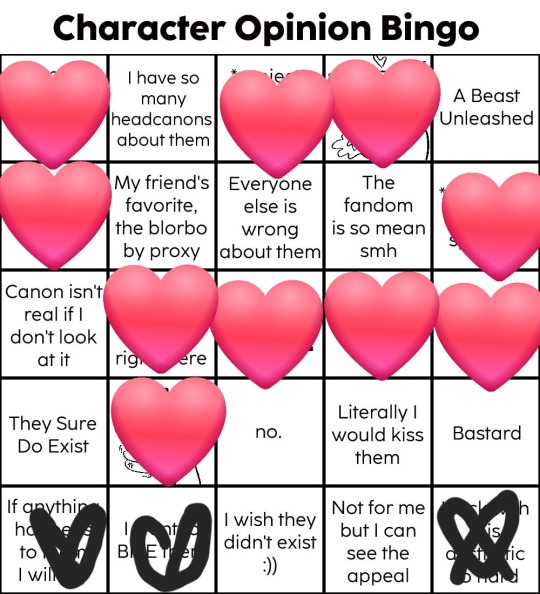
He's a weirdo!!! He's a little freak!!!! He's childish! He has a dark sense of humor! His comedy is extremely physical! He wants to be a shoe! His human disguise is a mustache over his mustache! He has a REALLY weird John Wayne impression! He's the butt of the joke! He's a sweetie! He can be a little mean! He has a complicated relationship with humanity! He can sing at borderline dog whistle pitch! He makes sandwiches for badgers! He got locked in a vault for (I'm not doing math) many many years! He's optimistic! He was delivered to his siblings in a box! He was built for war but believes in non-violent conflict resolution! He's naive! He enjoys making a fool of himself! He loves his siblings!!!!!!!!!!
7 notes
·
View notes
Text
I love how by seing how they each dealt with the boy we can see a bit of Cecil's, Carlos' and Tamika's parenting style.
Cecil is the supportive one, except he is very supportive no matter what. He might visibly and clearly disagree, like he does in relation to the boy holding the knife, but he won't verbally express it trying to find ways to be supportive and maybe redirect the kid: via giving him dinno chips and asking him gently to think more about his plan. In fact while the narration likely didn't help, Cecil sorta off acomplishes a goal, the boy does consider who he wants to stab and makes an action plan.
Tamika is a well researched mom, she read all the books in non-violent conflict resolution with kids but has none of the experience so she follows the rules, rarely making her owns (excluding the one that saved her: making a shield while speaking) and also not actually allowing the kid to participate (listening to the boy's reasoning and going from there).
Carlos is Carlos so his method is to create a hypothesis based on what he knows and present it to the kid/test it. Except not all theories work out in the end and maybe is the huge amount of times being right but be isn't really preparated to deal with a second hypothesis.
68 notes
·
View notes